News and views from our community
-
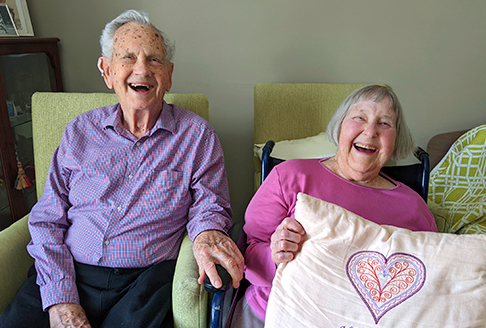
For John and Margaret, it's love, actually
Valentine’s Day is not just for teenage romantics. It is a reminder that love takes many forms, it endures, and it reaches out. Happy Valentine’s Day, Margaret and John, and thank you for the love you bring to the world.
- 13 Feb 2023
-

Faces of Baptcare #32: Meet Michelle Atkins, Communications Advisor and one of our We Care Award Winners
The We Care Awards are designed to identify and reinforce behaviours that are consistent with our WE CARE values and assist in achieving our strategic goals. The Awards are peer nominated, with the eventual winners selected by our Baptcare Reward & Recognition Panel. Winners are selected for their demonstrated professional excellence, deep commitment to our organisational values and outstanding contributions to Baptcare.* * *Teeming with bubbly positivity, it’s easy to see why Michelle is such an asset to our Baptcare family.As a Communications Advisor within our busy Mission and Corporate Development group, bouncing from COVID communications, to supporting new starters in the team, and all the while keeping an ear to the ground for some of the remarkable stories about Baptcare clients, staff and volunteers is enough to exhaust the most seasoned professional.But it’s all catnip to Michelle – or should we say ‘dognip’? (More on that later!).Writing was not her first choiceMichelle’s talent for writing - along with her seemingly boundless energy - is legendary amongst her teammates. Interestingly, though, a career in writing was not Michelle’s first choice. She graduated with a double degree in Arts/Law (Honours) from the University of Melbourne and joined the ranks of a prestigious city law firm.“My legal career was a bit accidental,” explains Michelle. “I had ‘primary school teaching’ and ‘journalism’ as my first choices for university courses but was encouraged to put in law at the last minute by the teacher because I liked words and debating.“I found the world of law a bit dry so I started my freelance writing career on the side, doing lifestyle articles, book reviewing (I still do this!) and eventually writing and publishing about ten books in the children and young adult categories when I changed careers into publishing. But I still haven’t achieved my dream of writing a bestselling piece of fiction.”Behind Michelle’s winning We Care Awards nominationEach We Care Award relates to one of Baptcare values: Wellbeing, Ethics, Co-creating, Accountability, Respect and Effectiveness. Baptcare’s Co-creating value speaks to our desire to build personalised and innovative solutions with clients and allied partners.An essential part of co-creating for the benefit of our clients is that often overlooked skill – listening. It’s here that Michelle truly excels, carefully peeling back the detailed layers of each story and skilfully rendering that information into compelling copy.Her nomination speaks beautifully to that essence:“In her role as a Communications Advisor, Michelle works with all areas of the organisation. She is highly skilled at listening to people and working with them to bring out their stories. Michelle's super-power is that she value-adds to every interaction, identifying the key elements of every story and presenting them in the best way to celebrate all that is good about Baptcare, our mission and vision. This is co-creation that is effective, respectful and inspiring.”How did she feel to know she had taken out a prestigious We Care Award in Co-creating?“I was so excited to win the We Care Award, particularly for Co-creation because I’m happiest when I’m collaborating with people (except for my teenage daughter’s endless shopping lists…). I had no idea that I was nominated and got a genuine surprise. I’m not usually someone who wins things. Here’s a bit of a violin story…but when I was ten years old, I went to a musical concert and bought a raffle ticket where the prize was an organ. Anyway, the tickets were based on seat numbers and, at the last minute, I changed seats… and, yes, you guessed it, I moved from the winning seat!”Why Michelle loves working at BaptcarePut simply, it seems the people are the glue that keeps Michelle bound to Baptcare.“I have never met so many inspirational and big-hearted people in one workplace. A special callout to my Comms team members here too – I adore and respect them all and feel so lucky to work (and laugh) with them daily. (And yes, they are hovering over my screen as I type this…).“I also love the core/mission of Baptcare. Having worked in some soulless corporate environments, I find great purpose in the breadth and depth of the work Baptcare do - work that at the end of the day, makes a difference to people’s lives (and not just to a cold spreadsheet).”And … about that ‘dognip’ …One thing you cannot help but learn about Michelle upon meeting her, is that she loves her dogs. Actually, that’s too narrow – she loves her dogs, but also adores shopping for dog accessories, dog themed items and recommending great doggy related deals from the world of online shopping. Ask her about a great little doggie patterned notebook at Kmart for a few dollars – her mates at work all have one now!When pressed to explain where her love for all things canine comes from, Michelle is quick to respond: “I am a bit dog-obsessed (my family call me ‘the crazy dog woman’) but this is only a recent thing!” she laughs.“I used to be petrified of dogs after a German Shepherd jumped on my sister when we were little. But then about ten years ago, I moved to Singapore with my family for three years and we were asked to rehome a dog, Scruffy, who had been left behind by his Australian family. After Scruffy, we welcomed two ‘oodles’ into our family, Billi (the toy cavoodle) and Pinji (a lockdown puppy schnoodle) and I love the mayhem of a house with dogs! I love the natural happiness of dogs, and particularly how affectionate and funny they are, every single day.”Bravo Michelle! We’re so glad to have you in our ‘pack’!Congratulations on your award from everyone at Baptcare.
- 23 Jan 2023
-

Faces of Baptcare #31 - Meet Nicholas Coleman
The skills and heart of Baptcare’s staff never ceases to amaze!Meet Nicholas Coleman, our Faces of Baptcare #31.A marathoner who credits running for helping keep his mental health in check, Nicholas has organised the Run for Rural Relief on 22 January where he will be doing a 68km Ultra Marathon in the Devonport Latrobe area. The run will raise money for Rural Business Tasmania’s Rural Relief Fund for farmers and small businesses affected by flood in north-west Tasmania last October.Helping comes naturally to Nicholas. Starting in Baptcare’s Karingal aged care community kitchen four years ago, his connection with the residents meant that he was asked to take on a Care Assistant role. Nicholas, you are about to run in an ultramarathon – 68km. Firstly – wow, and secondly, have you always been a runner and involved in marathons?I have always been a runner from a young age and always played lots of sports. My parents entered me into running events as a kid and back then I had natural ability. Nowadays it takes loads of hard work!As for marathons, my preferred run is actually 10km. I’m also a very keen footy umpire, currently a senior footy umpire for the North West Umpires Association in the North West Football League in Tasmania.Have you done any marathons before? Do you have any marathons on your bucket list?Yes, I’ve run marathons, but only in training. I would love to do international marathons but they are a bit pricey for my stage of life with a young family (two children) to help support.As for a bucket list marathon – I’d like to do some local Tasmanian/trail marathons such as the Gone Nuts 101 km run in a few years time.What do you like about running?I like the freedom of running and also being able to explore your city or state.I’ve suffered with anxiety/depression throughout my whole life and have found that running is a good way for me to manage my mental health and to de-stress for a couple of hours.I’m leading a good healthy life now with some good strategies in place – and running is a major part of this.Tell us about the Run for Rural Relief. What inspired you to organise this?It’s a 68 km run that I’m doing to raise money for Tasmanians affected by the floods.It’s a community thing and fully inclusive. People can walk and/or run alongside me for small sections of the run.This run is not about me – it’s about the whole community – about joining together to help those who have gone through the floods in Tasmania.Do you have any special running rituals?Not really. I run off feeling.For the actual run I will eat Revvies energy strips, gels plus other food in addition to keeping hydrated.I listen to music and podcasts for my training runs but for the actual run, I’m hoping to chat to people who may run alongside me. It will be a great chance to share stories and for the community to enjoy being active.One person has already volunteered to run 34km with me, so I’m really excited about that!What are your top songs to run to in training - or do you run to podcasts?Music: Foo Fighters, and I’m a huge Country music fan, so I like Tasmanian band the Wolf Brothers and also the Zac Brown band.Podcasts: Talk Hard by local Tassie man Brendan Hingston.Everyday Lions, where Bryan Lyons interviews an everyday runner who has a great back story to tell.I also listen to former AFL football player Dylan Buckley on his podcast Dyl and Friends.What is your current role at Baptcare, and what does it involve day to day?I’m currently a ECA (Extended Care Assistant) in the Leisure and Lifestyle area at Baptcare’s Karingal Aged Care Community.The job is quite broad and involves doing whatever I can to help my residents including showers, personal care or putting them to bed. Other days it may be just sitting and talking with them.How long have you been at Baptcare?I started in the Karingal kitchen four years at ago before being moved into a care role. Apparently, people liked my interaction with residents, so I was encouraged to do my Cert 3 in caring and became a carer. I’m now about to start Cert 4 in Leisure and Lifestyle.What do you like about working with Baptcare and in the aged care space? I really like to help people. I love the connections you make with residents, their families and my colleagues. I find that they become like family to me – like your grandparents or friends. It’s a really rewarding job. Yes, it has its challenges but mostly it is very rewarding.In my past I’ve had some mental health challenges and been through something hard. I was so grateful for the care I was given then, so I wanted to give something back. It just took me a few years to get into the right place.Can you share a particularly special workday/resident interaction you’ve had recently?Recently, I dressed up as Santa and took the residents on a bus trip to see local Christmas lights. The residents loved it!I also feel very privileged to be able to spend time with residents at their palliative stage. This feels very special because the family have given you permission to be with their loved ones at such a vulnerable time.Do you have a favourite quote or motto in life?#getitdoneI use it in a hashtag in my posts – ‘get it done’. I used to be a procrastinator, but in 2020 when I reunited with running and just made myself do it, #getitdone became my mantra.If you could go on a long run with someone, who would it be and why?Nedd Brockmann, who just ran 4000km across Australia. A good day would be going on a 30 km run with Nedd and some of my local Tasmanian running mates. Is there anything else you’d like to add? Just to say that this run is not about me – it’s about the whole community and especially those who have gone through the floods in Tasmania. I’m really just the campaign awareness guy. You’re much more than ‘just the campaign awareness guy’ to us Nicholas and we’reso thrilled that your running feet led you to Baptcare. We thank you for your wonderful care and wish you all the very best on Saturday 22 January with your Run for Rural Relief.You can read more about the Run for Rural Relief at https://runforruralrelief.com/ and donate if possible.
- 16 Jan 2023
-
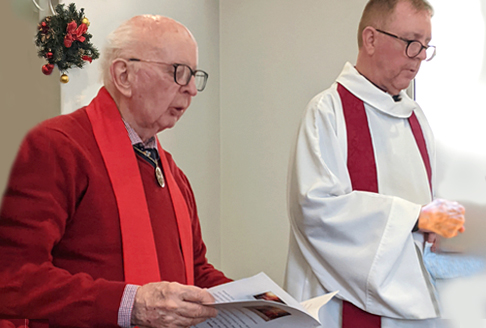
Every Sunday service is special at Karana
It’s Sunday morning at Baptcare Karana community. Time for the church service has been a weekly event for residents since Karana opened in 1959.
- 28 Dec 2022
-
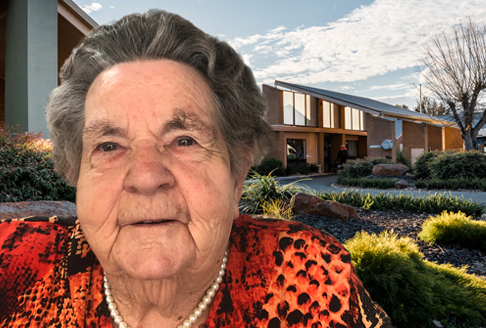
Stories from Kerang – Northaven resident, Beryl Baker
I have been very well looked after here for four and a half years now. It has been my privilege to be able to play the piano every Tuesday morning for devotions and help whenever I can. I do a lot of knitting.
- 28 Dec 2022
-
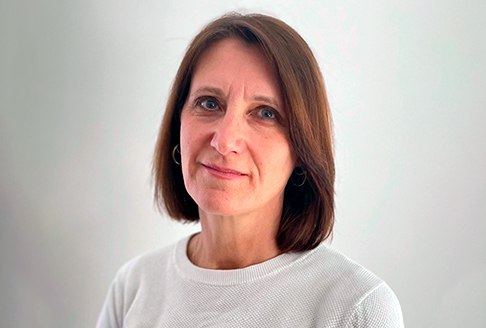
Faces of Baptcare #30 – Meet Anne Beveridge
What is your current role at Baptcare, and what does a typical day involve?I am lucky enough to be working as a People Services Specialist within the Workforce team which is in the broader People, Culture and Safety team. Our team processes all the changes in employment for all Baptcare staff. This can be a change in role, status, hours, parental leave, pandemic leave etc. There are also lots of miscellaneous questions from staff. I work with eight of Baptcare’s Residential Aged Care sites processing their changes and answering queries.What has been your career journey at Baptcare?I started working at Baptcare’s The Orchards in September 2021. I was the Roster Clerk/Receptionist there until the end of January 2022. In February I moved into the Receptionist role at head office in Camberwell then started my current role in July. I have been around a bit but very happy with where I am!Have you always wanted to work within the People and Culture space?I never really thought that it was an option for me as it’s not an area that I had ever worked in previously. But I am very lucky and happy to have the opportunity to be here now.What did you want to be as a young child?I wanted to be a physical education teacher because I was crazy about sport. I loved watching it and playing it, especially cricket and hockey.Can you tell us two surprising things about yourself?I love acorns. Yep, acorns. Just because. Also, I collect old copies of the book Gone With The Wind. I think I have about 75 copies. Best book and movie ever.Can we just revisit your love of acorns please? Where did your interest begin?When I was in primary school we had a huge acorn tree at the top of our street and used to love sitting under there and playing with and collecting the acorns. I also love the feel of them and their little hats! I have them in my car, my husband’s car, all my coat pockets and on my desk at home.Do you have a favourite quote or motto in life?My family are probably sick of hearing me say it, but I always tell them that it’s a good day when you get to learn something new. Also, I do remind them how lucky we are to live in Australia. I repeat this one endlessly while watching the news.How would your friends describe you?The organiser. I’m the one who always seems to organise our get-togethers. Not sure if that makes me more needy than the rest of the girls. If you could sit next to someone at a dinner party, who would it be and why?Younger me would have loved to sit next to Rod Marsh, the ex-wicketkeeper for Australia and WA. I was a wicketkeeper when I played, many, many, many years ago and I used to be obsessed with cricket! Now I’d love to be able to sit and spend time with my dad, who passed away last year.You share the same surname as Leanne Beveridge, the General Manager for the People, Culture and Safety team at Baptcare. Are you related?No I’m not. But we share the same birthday!
- 21 Dec 2022
-
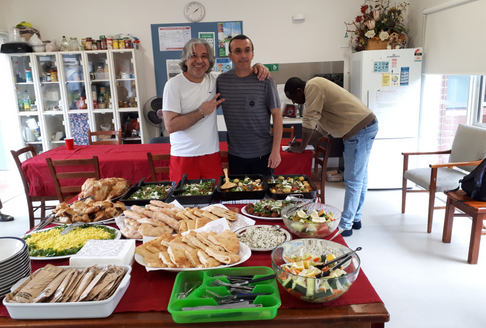
A day in the life of a caseworker at Sanctuary — farewell and best wishes, John Mirabile
John Mirabile, one of Sanctuary's most experienced and long-serving caseworkers, recently bid us farewell. His career with Baptcare spanned more than ten years and many eras in asylum seeker policy.John was farewelled at a very moving lunch prepared and attended by our residents. Their message to him was of overwhelming love and gratitude for all the times he has walked alongside them and been a ‘brother' in their hardships.What does a Sanctuary caseworker do?Casework is a multi-faceted role addressing both the practical and the emotional realms of human needs. The overriding objective is always to help the person gain independence, confidence and the skills to solve their own problems — it's not as simple as just stepping in and fixing the issue.The caseworker needs to act like a buddy as well as an advocate: providing information, suggestions, encouragement and advocacy to boost the person's own abilities and equip them to overcome the barriers confronting them. At the same time, they must ensure that each client's interests keep moving forward - that essential information is submitted, timelines met, reports prepared, appointments scheduled and attended. Please consider donating directly towards critical support for people seeking asylum by clicking hereGetting life back on trackHealth and legal matters are important areas of life: homelessness is part of a bigger picture of disadvantage and deprivation. The caseworker's role is to help the person get their life back on track now that they have housing at Sanctuary.In a typical day, John would deal with residents' routine health needs — explaining hospital letters, providing information about transport so that residents who don't speak English can get to their appointments, providing MYKI (public transport) top-ups if the person is without income, sometimes accompanying them on medical visits to ensure that they find the correct clinic and that an interpreter is present. John frequently accompanied residents to the city offices of Home Affairs to be the familiar and kindly face they can look to for explanation about their caseOn many occasions, he has dealt with pressing health emergencies amongst his clients — suspected heart attacks, acute mental health crises and injury and illness arising from self-harm (which is itself the expression of despair and devastation). Caseworkers are not health-trained so the limits of their intervention are a fast assessment, calling emergency services, providing first aid, staying on hand to facilitate communication and then giving trusted emotional support to the distressed person.The major concern of people seeking asylum is their application for protection — getting a visa to enable them to stay and work rights to earn income and access Medicare support. Caseworkers dig deep and search widely to secure pro-bono legal assistance for their clients so that they can get informed advice in the very complex and specialist field of immigration law.When people have been homeless, their documents can be hopelessly soiled or lost - caseworkers help with recovering and replacing lost credentials. Ensuring complex correspondence is made more accessible by discussing it with the person is another important aspect of the job, as is sitting with them to provide support and reassurance when challenging news is provided by their lawyer. John frequently accompanied residents to the city offices of Home Affairs to be the familiar and kindly face to look to for support and explanation about their case.A path to independenceOther areas include residents' efforts to find work — getting resumes into shape, making applications and assisting in interview preparation, helping with clothes for the interview, coaching to ensure that expectations and behaviours are appropriate for the workplace. For those who don't have work rights, or who can't find work, help obtaining income supplements or emergency relief is vital.The essence of John's greatness is that he listens to and respects his clients' hopeMost people seeking asylum have no eligibility for Centrelink payments and live precariously. John and the casework team distribute vouchers - $40 per month per person is the limit that we can provide but we also access other sources of assistance to allow for basic needs to be met. Through the Sanctuary Foodhub, a ministry of the West Preston Baptist Church, rescued food is collected and distributed to residents, ensuring a continuous supply of nutritious meals.A message of hopeThe overwhelming issue for many people seeking asylum is hope — the hope for a visa and the opportunity to make their home in Australia, to be reunited with their families and to be able to work and pay their way. Many residents at John's lunch affirmed that the essence of John's greatness came from the fact that he listened to and respected their hope. The tears and speeches at the lunch table were the proof of that.
- 08 Dec 2022
-
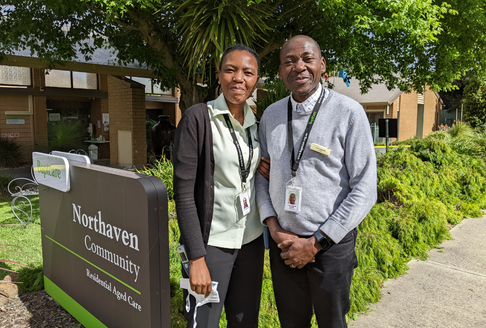
Nancy and Fred: Caring for the whole person
Our belief at Baptcare is that care should be holistic – not just looking after people’s physical requirements, but also their spiritual and emotional needs.At Baptcare Northaven Community in the northern Victorian town of Kerang, these equally important aspects are overseen by a married couple.Nancy Mugambi is the Nursing Unit Manager. Her husband Fred is the Spiritual Care Coordinator, as well as the local Baptist Pastor. Since moving to Kerang five years ago with their two children they have become highly valued members of the community.NANCY – WHY I LOVE MY JOB“I like my job because I like changing people’s lives. I love working with the older generation. They are a good bunch, and I especially like when we can put a smile on their faces. I also really enjoy the team here, they are supportive and everyone knows everybody.”NANCY – WHAT I DO“In my job I offer clinical support and oversight to residents as well as acting as liaison between residents’ families and multi-disciplinary teams. Additionally, I support Registered Staff and Personal Care Assistants who collectively deliver seamless service to the residents.“We take care of the clinical and psycho-social needs of our residents. For example, if a resident needs to see a GP, speech pathologist, podiatrist, dietician or psycho-geriatrician, I organise and oversee this. In this job, it is paramount to keep families informed about whatever is happening with their loved ones.”NANCY – WHY FRED’S WORK IS IMPORTANT“God gave Fred this personality that when you sit with him, before you know it you've given him your whole life story. He has a way of extracting information from you, and such a calm nature. I have seen people who are turbulent or even violent, and I have witnessed them calm down when Fred is around them. Over the years we have worked alongside each other, he has been instrumental to my role as I have referred residents to him and there has been a very high rate of success. He is wonderful at building rapport and trust.“If residents have emotional needs, they will tell Fred even when they might not tell me or anyone else on staff. Due to the nature of our work and the time constraints, we are often task-oriented, running to the next job, but Fred, as the chaplain, will sit with them and have a chat. If there are any concerns he will relay them to me or other staff members. These issues range from clinical, to my toast was not well buttered, to some extra TLC because of what they may be going through. Nothing is trivial!“His role is just so important. It completes the puzzle.”FRED – WHY I LOVE MY JOB“The key for me is making sure there is emotional support for residents. I love being available to help people along. We need to build relationships and show people they can feel safe to talk about things. It is the most important part of my job, to be there for people when they need that support.”FRED – WHAT I DO“I visit people, sit and listen to their stories. For example, when the floodwaters were coming to Kerang this year there were people who wanted to tell stories of the past floods – not just 2011, but 1955-56 as well. Those stories gave us hope because we could say, we know that this flood will be scary, but it will pass.“We work to support people’s spiritual interests. This includes rituals, devotions, Bible reading, prayer. I work with the wider faith community in Kerang, and facilitate access to leaders of other faiths – Catholic priests, and Anglican ministers for example – to make sure there is support for rituals from residents’ own religious traditions.“For some residents, it is hard to transition from home to an aged care home They can arrive with grief about loss of independence, loss of their home, or they can be angry at their families, or have a traumatic personal or family history. I am there with them through that transition, to journey through that with them and let them know they are supported and not alone.”FRED – WHY NANCY’S WORK IS IMPORTANT“Nancy plays a very key role in charge of our clinical staff. She works with specialists in the community, dealing with medical issues. She works with families, like I do, but on a different level. She is a very caring person, not just towards our residents but also other staff. We try to work together to bring more harmony.”
- 05 Dec 2022
-
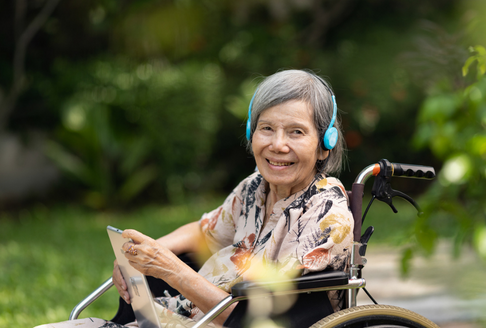
Music as a supportive therapy for memory loss
In the opening moments of the documentary ‘Alive Inside’, a startling event takes place. A 90-year-old woman with dementia is struggling to remember a time in history. She looks apologetically at the interviewer as she explains how her memory has faded. She seems slightly embarrassed by the fact and resigned to her fate.Remarkably, when the interviewer plays music from the past, her eyes light up. She starts to recall a range of events and occasions taking place in her life at that time. Names, facts, circumstances and laughter pepper her speech as she recalls things in detail. Things that just seconds ago were lost to her.Which leaves open a tantalising thought: are people experiencing memory loss actually going through a process where those memories are lost forever? Or are some pathways to those memories just more blocked than others?No one can doubt the degenerative nature of dementia, Alzheimer’s and many other conditions affecting recall and memory. Currently, there is no cure for dementia and Alzheimer’s. For people experiencing these conditions, however, there is an ability to improve quality of life through supportive therapies.Positive experiences have been recorded in relation to the impact of music therapy on many people with these disorders. What if, at least in the early stages, music therapy can make a significant impact on the quality of life for people experiencing memory loss?Music at Baptcare residential aged care communitiesBaptcare offers residents the opportunity to enjoy live music across its residential aged care communities. At a recent piano concert provided by one of our talented volunteers, the joy experienced by residents was on full display. Eyes brightened as many recalled childhood piano lessons, while others recalled singing rehearsals as part of the school choir.Caroline*, a resident of one of our residential aged care communities in Melbourne, shared happy memories of singing for the nuns at her convent school. “I started singing lessons at school when I was six years old,” she said. “We did group singing next to the piano – I remember much later on performing the Sleeping Beauty opera. We’d always sing at the cathedral on Sundays and a nun would play the piano.”Another resident, Philippa*, shared her experiences learning piano with a strict teacher who would rap her over the knuckles with a wooden ruler if she hit a bad note. “Madam Sophie* was so strict! Oh, I dare not hit the wrong key during practice!” she laughed.Stories like these were shared between residents and staff well after the concert had ended. People were connecting not only with their cherished memories of days gone by, but also with each other. (To watch a short video profiling one of our volunteer pianists, Louis Schmidt, click here).What is music therapy?Music therapy has been found to reduce agitation in people experiencing dementia (Livingston et. al. 2017: 2703). Dementia Australia lists music therapy as a non-drug alternative therapy for people living with dementia which may improve quality of life. But what is it?The Australian Music Therapy Association (AMTA) is Australia’s peak body for music therapy. It defines music therapy as 'the intentional use of music by a university-trained Registered Music Therapist (RMT) that draws on an extensive body of research to incorporate a range of music making-methods within and through a therapeutic relationship' (AMTA 2020: 2).The organisation has a set of five Competency Standards that all applicants must satisfy – music skills, psychosocial knowledge, clinical knowledge, music therapy knowledge and music therapy skills. Registered music therapists create bespoke music therapy programs to address specific client goals.Some limitations of music therapyWhile music therapy has seen positive effects for some people with dementia, it’s true that not everybody responds well to this style of intervention.Garrido et.al. (2020) conducted a trial of a music playlist guide with 45 people with dementia and their caregivers in residential care facilities and home-based care. Their research indicates that while improvements to quality of life can be enjoyed by those experiencing dementia, multiple studies show that some people do not respond to music therapy in a positive way (Garrido et.al. 2020:220). This points to the importance of trained music therapists developing and monitoring programs to ensure recipients’ mental health is not compromised. While music can be a source of great joy, it may trigger unhappy memories for some people or cause emotional overstimulation.If you are living with or caring for someone with dementia, you may like to explore the value of music therapy as part of their supportive therapies. Consider speaking with your medical practitioner about the appropriateness of a tailored music program for your loved one.To quote author and poet Michael Bassey Johnson: “Music replays the past memories, awakens our forgotten worlds and makes our minds travel.” And that is what fullness of life is all about.*Names have been changed for privacy reasons. Stock image used.References:AMTA (Australian Music Therapy Association) 2020 Royal Commission – AMTA Response to Counsel Assisting’s Proposed RecommendationsGarrido S, Dunne L, Stevens CJ and Change E (2020) ‘Music Playlists for People with Dementia: Trialling a Guide for Caregivers’, Journal of Alzheimer’s Disease 77(1) 219-226. DOI 10.3233/JAD-200457Livingston et. al. (2017) Dementia prevention, intervention, and care, The Lancet Commissions, Volume 390, Issue 10113, P2673-2734, December 16, 2017. http://dx.doi.org/10.1016/S0140-6736(17)31363-6
- 02 Dec 2022
